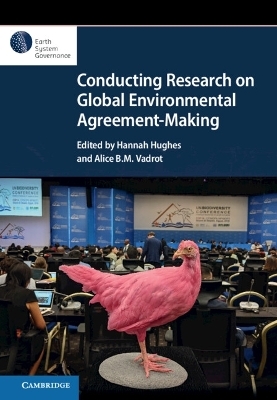
Conducting Research on Global Environmental Agreement-Making
Cambridge University Press (Verlag)
978-1-009-17944-7 (ISBN)
Global environmental negotiations have become central sites for studying the interaction between politics, power, and environmental degradation. This book challenges what constitutes the sites, actors, and processes of negotiations beyond conventional approaches and provides a critical, multidisciplinary, and applied perspective reflecting recent developments, such as the increase of actor diversity and the digitalisation of global environmental meetings. It provides a step-by-step guide to the study of global environmental negotiations using accessible language and illustrative examples from different negotiation settings, including climate change, biodiversity, and ocean protection. It introduces the concept of 'agreement-making' to broaden understanding of what is studied as a 'site' of negotiation, illustrating how diverse methods can be applied to research the actors, processes, and order-making. It provides practical guidance and methodological tools for students, researchers and practitioners participating in global environmental agreement-making. One of a series of publications associated with the Earth System Governance Project: www.cambridge.org/earth-system-governance.
Hannah Hughes is Senior Lecturer in International Politics and Climate Change in the International Politics Department at Aberystwyth University. Hannah's central research concern is global environmental degradation and the forms of knowledge that inform the political response, as well as the necessary conceptual and methodological innovation to advance understanding of this. She has examined this through research on the Intergovernmental Panel on Climate Change (IPCC) and published findings in Nature Climate Change and Global Environmental Politics. Hannah is co-investigator on the ESRC grant The Politics of Science in International Climate Cooperation and has a forthcoming book on The IPCC and the Politics of Writing Climate Change. Hannah and Alice began their collaboration in 2016 with the aim of initiating greater discussion on the study of negotiation sites through the concept of global environmental agreement-making, editing a special section in Global Environmental Politics and leading a multi-authored perspective piece in the Earth System Governance journal. Alice B. M. Vadrot is Associate Professor for International Relations with a focus on Environmental Politics at the Department of Political Science of the University of Vienna and Visiting Research Fellow at the Centre for Science and Policy (CSaP) of the University of Cambridge. Her work addresses the role of knowledge and science in global environmental politics. She has extensively researched the Intergovernmental Platform on Biodiversity and Ecosystem Services (IPBES) and developed the concept of “epistemic selectivities”. As PI of the 5-year research project MARIPOLDATA, funded by the European Research Council (ERC) she develops and applies a new interdisciplinary methodology to study agreement-making and the interrelations between marine biodiversity politics and ocean science in practice. Vadrot is the author of “The Politics of Knowledge and Global Biodiversity” (Routledge, 2014) and editor of several special issues, research articles and editorials inter alia in Global Environmental Politics, Environmental Politics, Nature and Marine Policy.
1. Introduction: broadened understanding of global environmental negotiations Hannah Hughes and Alice B. M. Vadrot; Part I. Developing a Methodology: 2. Starting: practical and ethical considerations Alice B. M. Vadrot and Hannah Hughes; 3. Frameworks: developing and working with analytical frameworks Michele Betsill and Naghmeh Nasiritousi; 4. Concepts: selecting, applying and innovating concepts Hannah Hughes and Alice B. M. Vadrot; 5. Stakes: conducting relational research with indigenous peoples Marcela Vecchione-Gonçalves with Hannah Hughes; Part II. Navigating Sites: 6. Negotiations: navigating global environmental conferences Tracy Bach and Beth Martin; 7. Beyond negotiations: studying side events, exhibition booths, and other neglected conference spaces Jennifer Bansard; Part III. Collecting and Analyzing Data: 8. Texts: collecting and analyzing event documents Jennifer Iris Allan and Pamela Chasek; 9. Interviews: conducting and using interviews on and at negotiations Yulia Yamineva; 10. Ethnography: from method to methodology at plural sites of agreement making Kimberly R. Marion Suiseeya and Laura Zanotti; 11. Collaboration: working together across time and space Noella J. Gray, Catherine Corson, Lisa M. Campbell, Peter R. Wilshusen, Rebecca L. Gruby and Shannon Hagerman; 12. Networks: collecting data for social network analysis Matthew Paterson; Part IV: Implementing and Adapting: 13. Experiences: reflecting and comparing research on negotiations Arne Langlet, Timo Leiter, Ina Tessnow-von Wysocki and Harriet Thew; 14. Adapting: responding to unforeseen research circumstances Alice B. M. Vadrot; 15. Conclusions: reflecting on the future (study) of global environmental agreement-making Alice B. M. Vadrot and Hannah Hughes; Index.
| Erscheinungsdatum | 01.08.2023 |
|---|---|
| Zusatzinfo | Worked examples or Exercises |
| Verlagsort | Cambridge |
| Sprache | englisch |
| Maße | 176 x 251 mm |
| Gewicht | 720 g |
| Themenwelt | Naturwissenschaften ► Biologie ► Ökologie / Naturschutz |
| Recht / Steuern ► EU / Internationales Recht | |
| Recht / Steuern ► Öffentliches Recht ► Umweltrecht | |
| ISBN-10 | 1-009-17944-6 / 1009179446 |
| ISBN-13 | 978-1-009-17944-7 / 9781009179447 |
| Zustand | Neuware |
| Informationen gemäß Produktsicherheitsverordnung (GPSR) | |
| Haben Sie eine Frage zum Produkt? |
aus dem Bereich


